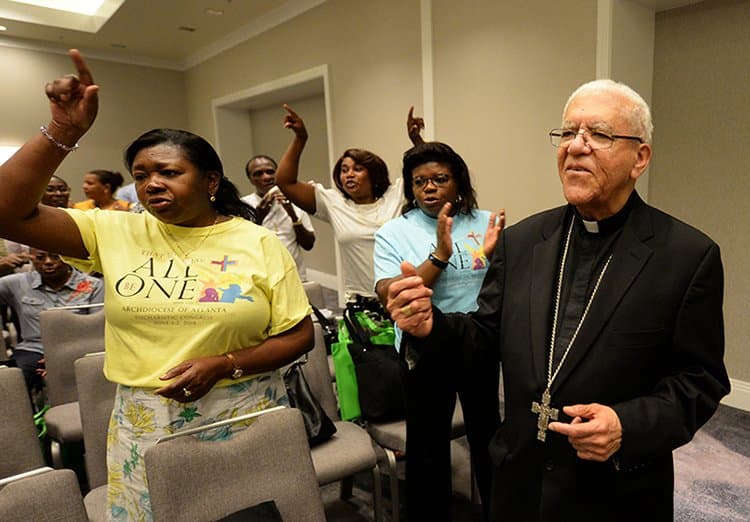NEW YORK – When Patricia Brintle founded the From Here to Haiti nonprofit in 2010, she remembers that Bishop Guy A. Sansaricq was a stabilizing force throughout the process, remaining by her side for the next 10 years guiding the organization’s efforts to aid the Caribbean nation.
On Saturday, Aug. 21, Sansaricq, a retired auxiliary bishop for the Diocese of Brooklyn and the first Haitian bishop in the United States, died at age 86. Brintle, and others who knew him, describe him as a kind and humble man who was a quiet but effective leader and a lifeline to the Haitian community worldwide.
“I feel that we lost a giant. We lost a saint,” Brintle said. “For all From Here to Haiti has accomplished, it has been because of the guidance of [Sansaricq]. Haitians have suffered a lot, and the bishop had suffered a lot, but he never lost his faith, and that was the example Haitians were following.”
Bishop Nicholas DiMarzio described Sansaricq as an important figure for the Haitian community who was “very active, right to the end.”
“Bishop Sansaricq was the first Haitian American Bishop in the United States,” DiMarzio said. “He was a symbol of the progress of the Haitian people here and, as someone who served as a bishop, gave the Haitian community some recognition and stature as immigrant people, a ministry he served very well.”
Sunday, Aug. 22, was the 15th anniversary of Sansaricq’s episcopal ordination as an auxiliary bishop in the Diocese of Brooklyn. Auxiliary Bishop Octavio Cisneros of Brooklyn and Bishop Frank Caggiano of Bridgeport consecrated at the same time.
Cisneros said it was a special day, and said Sansaricq is now “in the company of the saints, together with Jesus who has called us to be his servants.”
He described Sansaricq as humble and a true pastor.
“He wasn’t very concerned about pomp and circumstance. He would be happy to stand at the end of the line. He will be happy to sweep the floor before a ceremony,” Cisneros said. “He was the kind of person that we want to see as a pastor. He was a man truly chosen by God to be an example of what it means to be an apostle.”
Sansaricq was born on Oct. 6, 1934, in the small town of Jérémie, Haiti, located on the country’s southern peninsula about 116 miles from Port-au-Prince.
About a decade later, Sansaricq’s priestly ordination was on June 29, 1960, at the Cathedral of Port-au-Prince. He spent the next year as an assistant priest at the Cathedral of Les Cayes. Then, in October 1961, he was sent to the Bahamas as the chaplain for Haitian immigrants in that country, where he would remain until September 1968.
Sansaricq spent the next three years earning a master’s degree from the Pontifical Gregorian University in Rome before being assigned to Sacred Heart Parish in Cambria Heights, Queens. He served there for 22 years, from 1971-1993.
His next stop was St. Jerome Parish in Brooklyn, where he was pastor from 1993-2006 before being ordained as an auxiliary bishop for the diocese. He would hold that role until his retirement on Oct. 24, 2010.
Throughout his time in the Diocese of Brooklyn, Sansaricq was committed to the Haitian community. He helped found and was the first director of the National Center of the Haitian Apostolate and created Haitian-Americans United for Progress.
Cisneros also noted that Sansaricq worked hard to translate religious works to Creole for the Haitian community.
Father Hilaire Belizaire, the pastor of the Sacred Heart of Jesus Parish in Cambria Heights and the coordinator of ministry to Haitian immigrants in the diocese, highlighted Sansaricq’s work ethic.
“Sansaricq never retired. He continued up until his last breath,” Belizaire said. “This is a man of great heart. He has great love for God and dedicated his life to his people, and he has that kind of spirit to welcome everyone, to be there for everyone.”
Monsignor Sean Ogle, the vicar for clergy and consecrated life in the Diocese of Brooklyn and chairman of the board of DeSales Media, said he last spoke to Sansaricq on August 17 to offer prayers for the people of Haiti after a 7.2-magnitude earthquake hit the island on Aug. 14.
(DeSales Media is a partner of Crux.)
Ogle said Sansaricq was planning relief efforts.
“So great and immediate was his concern,” Ogle said in a statement. “It was typical of this man, who was the soul of both charity and action. Our diocese was blessed to have such a priest and bishop, and he will be sorely missed.”
Only a few weeks earlier, Archbishop Thomas Wenski of Miami last spoke to Sansaricq about the assassination of Haiti’s president Jovenel Moïse. Wenski said he had known Sansaricq since about 1980. They worked together to coordinate the Haitian Apostolate in the United States, as the Diocese of Brooklyn and the Archdiocese of Miami have two of the largest Haitian Catholic populations.
Wenski looks at the growth of the Haitian Catholic community in the United States — which has added many parishioners over the years and now has about 70 priests nationwide — and acknowledges that it wouldn’t have been possible “without pioneers like Sansaricq that kept the faith alive in the early days.”
“May he rest in peace,” Wenski said. “It’s the passing of an era.”
Follow John Lavenburg on Twitter: @johnlavenburg















